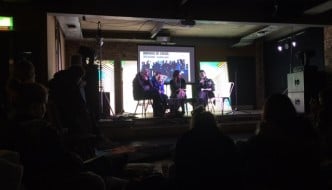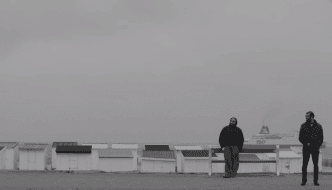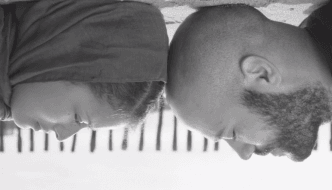The Refugee Crises in Europe workshop at Liverpool’s Europe & the World Centre
November 24, 2015

The Refugee Crises in Europe workshop was one of a series of events run by the Europe & the World Centre (EWC) from the politics department at the University of Liverpool. Going back to a university campus was strangely evocative of all those lectures attended as an undergraduate. Students waiting for their session to begin, with files and books under their arms, small groups in earnest but hushed conversation.
Lecture theatre five is a small, windowless room with fixed rows of traditional seats and book rails. I wondered how a participative workshop could get off the ground, with everybody seated facing forward. This really felt like a return to student days.
The audience was made up of academic staff, students and interested members of the public. Speakers and organisers exchanged quiet banter and the audience drifted in. Latecomers needed extra chairs to be called for, but then it was hard to fit them in. As the room filled up and the first speaker got going, ventilation became a problem and when the door was left open to cool the room. Noise from the corridor outside was intrusive. I suspect that they had not anticipated the level of interest in the topic.
Professor Erika Harris, the co-director of the EWC, warmly welcomed people from outside her department, and it felt a privilege to be able to learn about their work and current thinking about the refugee crises in Europe.
Professor Pogony, who has lived in Budapest for the last two years, gave a wide ranging talk, showing how the crises has resulted in both individual tragedies and profound new doubt about the future of the EU and its enshrined protection of Human Rights. He peppered his talk with academic references, which were clearly familiar to the academics, but left me feeling there is a lot I don’t know.
He highlighted the intolerance of Victor Orban, the prime minister of Hungary, and he questioned the reality of the apparent division between member states and their attitudes towards refugees. He contrasted the apparently liberal western and northern states with the unwelcoming and hostile central and eastern European states. He discussed the differences in the social, cultural and historical maps or roots of the different countries and showed the critical impact of this on attitudes toward refugees. He suggested that westerners are simply ‘more polished in their language of tolerance’ whilst in reality they are deeply intolerant.
Harriet Gray then gave a succinct overview of the legal aspect of the refugee crises, setting out the legal parameters of what the EU can do, is doing, and could do, as well as where ‘opt outs’ apply. She emphasised the importance of a shared political will to address the problems as the EU does have the legal competence to act.
She pointed to Article 80 of the Treaty on the Functioning of the European Union (TFEU), which states that: ‘The policies of the Union and their implementation shall be governed by the principle of solidarity and fair sharing of responsibility, including its financial implications, between the Member States.’ Yet if one country does not wish to comply, there is little that can be done about it. In response to questions from the audience she said “if everyone was willing, it could be done!”
I would have liked more discussion about this, and the link to Professor Pogony’ s stance. If our cultural history dictates our country’s limited response to the dire plight of refugees, what can or should be done about it?
In his introduction to the panel discussion Dr Balch suggested there is a crisis in liberalism in the EU, reflected in the way we contain, criminalise, and deport migrants. He pointed out the importance of the choice of words used to describe the situation, questioning the meaning of the word crises and its effect on public attitudes, which has contributed to a “catastrophic retreat into nationalism”. Yet despite this, what we are seeing is the limit of state power and the incorrigible spirit of migrants.
The layout of the room did not make informal discussion easy. The panel took questions from the audience and the difference in knowledge and style between the academics and the general public in the audience became very clear. One or two people found it hard to be succinct and wanted to relate their own experiences, but the chair was skillful in ensuring that they were respectfully heard but did not dominate.
This was a stimulating workshop, where questions from the floor reflected the breadth of issues covered. I would have liked more time for consideration of what could be done about the problems caused by the sheer size of the problem and the intolerant and hard line stance of so many member states. The thoughtful and informed views of the speakers raised more questions than answers but it certainly gave us all a lot to think about.
The Liverpool University series of events offer a great opportunity to learn more. They are genuinely inclusive and cover a wide range of topics. The next is aimed at children, to learn about germs – Rudolph the Sneezing Reindeer!
The Refugee Crises in Europe workshop was chaired by Professor Erika Harris, Department of Politics, Liverpool University. Participants included Professor Istvan Pogany, Professor Emeritus of law, Warwick University and Visiting Professor at the Central European University in Budapest; Harriet Gray of the University of Liverpool’s School of Law; and Dr Alex Balch, Department of Politics, University of Liverpool.




Comments